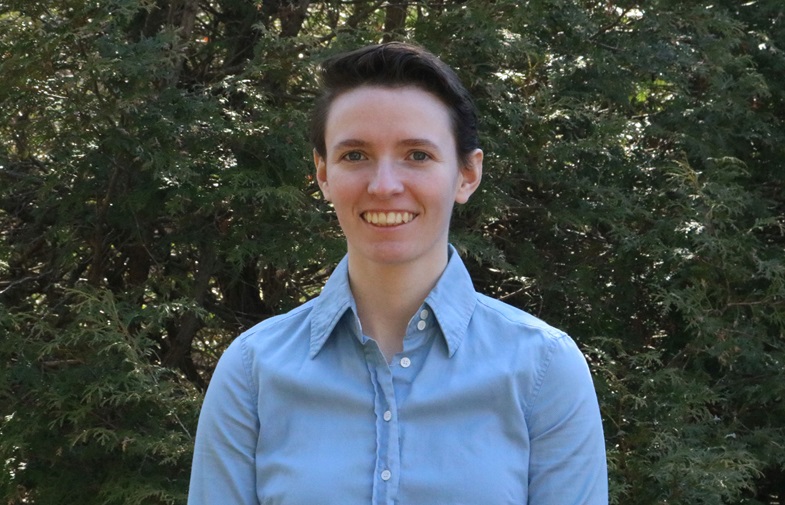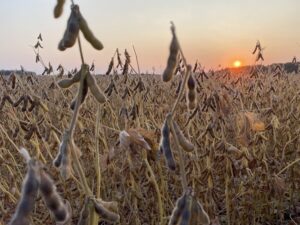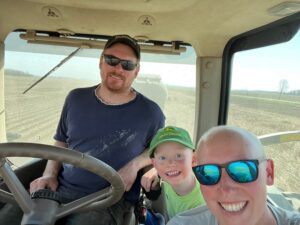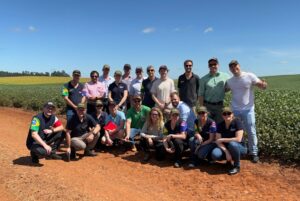The problem solvers: Kelsey Boucher
BATTLING SUDDEN DEATH SYNDROME

AWARD-WINNING, MOTIVATED, OUTSTANDING — THIS IS HOW YOUNG SOYBEAN SCIENTIST KELSEY BOUCHER IS DESCRIBED by people who know her, including her graduate advisor, Dr. Istvan Rajcan, professor and graduate program coordinator for soybean breeding and genetics at the University of Guelph. She is co-advised by Dr. Milad Eskandari.
Since May 2022, Boucher has been working towards her M.Sc. degree in the Department of Plant Agriculture, focusing on identifying quantitative trait loci (chromosomal regions) associated with resistance to sudden death syndrome (SDS) in Canadian elite soybean genotypes. This topic is considered a high priority by both Grain Farmers of Ontario and the Ontario Agri-food Alliance, which financially supports Boucher’s research.
“The genetics of SDS resistance is a very important topic,” says Rajcan, “and Kelsey is making excellent progress in the collective effort to achieve better control of the disease. She has been an outstanding student who has won several awards during her studies, including the second prize for a poster award at the 2024 Soybean Breeders Workshop held in St. Louis, Missouri, in February 2024.”
Like many of her peers with a passion for improving crops, Boucher hails from a farming community, in this case, a small town called Kars just outside of Ottawa. “While I am not from a farm myself, my grandfather was a proud farmer in the community and growing up, most of my neighbours were farmers,” she says. “This upbringing gave me a large amount of appreciation for the work farmers do, including the hours they put in and the risks they must take in terms of their farms’ profitability. As a child, I watched farmers lose their profits for the year due to disease, flooding, drought, etc., wiping out their crops. I knew I wanted to help them achieve consistent yields year over year.”
After learning more about agriculture during her undergraduate degree, Boucher felt strongly that the best way she could help farmers secure high yields was through breeding, particularly breeding for resistance to the various stresses crops face throughout every growing season. When she was accepted to do a master’s degree at the University of Guelph, she couldn’t wait to get started.
Over the past two years, Boucher has completed experiments evaluating the degree of SDS resistance in what’s called a Canadian soybean diversity panel. This has meant testing about 250 different soybean varieties both in the greenhouses at Agriculture and Agri-food Canada Harrow and in the field. “This includes screening lines for symptoms in naturally infected fields, inoculating plants in a growth chamber environment, and finally conducting a Genome-Wide Association Study to determine genomic regions of interest,” she explains. “In the near future, my goal is to determine genomic regions of interest that have not been previously identified by others. In doing this, I would be answering the question of whether there is novel SDS resistance present in the Canadian germplasm.”
This will lead over the long term to her long-term goal of producing hardier soybean crops, particularly those with more disease resistance. However, the path to success with resistance is not an easy one to manoeuvre. “When host plants are given better resistance, the pathogen will often also evolve to be able to overcome that resistance,” says Boucher. “Breeders must, therefore, constantly look for new potentially-beneficial genomic regions.”
Indeed, crop geneticists like Boucher are in an ongoing battle against the power of pathogen genetics, but she is dedicated to this fight for the long haul. “By next year, I hope to start my PhD,” she says, “and I am excited about the future, about making further contributions.”
Rajcan notes that during her graduate studies, Boucher has shown initiative and excellent planning and organization skills. “She has been a stellar and exemplary student who is a true pleasure to work with,” he says. “I foresee a bright future for Kelsey as a young scientist.”
This research is funded by Grain Farmers of Ontario and the Ontario Agri-Food Innovation Alliance, a collaboration between the Government of Ontario and the University of Guelph. •



























